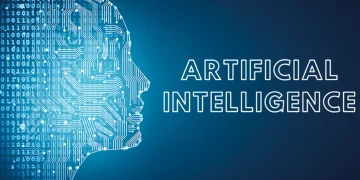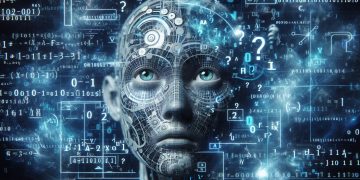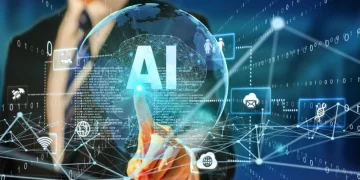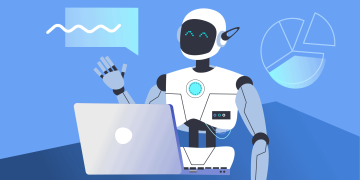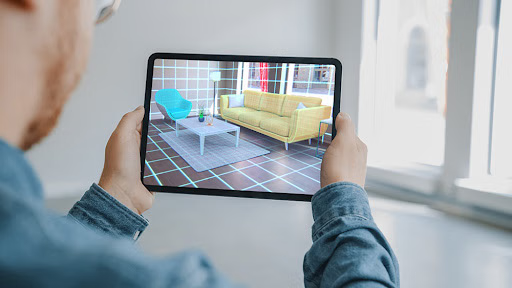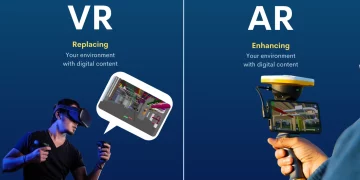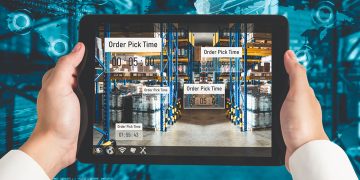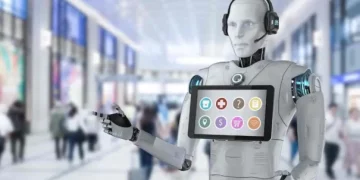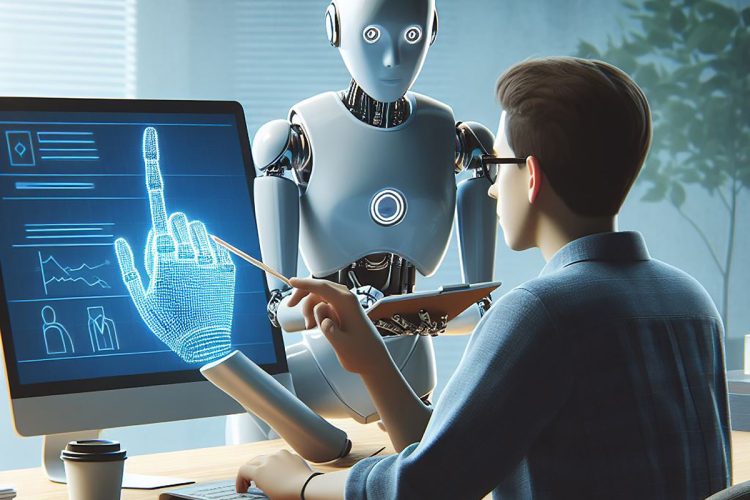Introduction: When Algorithms Shape Humanity
The rise of Artificial Intelligence (AI) is not only a technological revolution but a profound moral and existential challenge. Beyond automating tasks, AI influences decisions, behaviors, and perceptions — subtly reshaping human identity and agency. From personalized news feeds nudging political opinions to AI tutors shaping learning trajectories, algorithms increasingly operate in domains traditionally reserved for human judgment.
This raises an urgent philosophical question: How does AI affect our understanding of free will, moral responsibility, and the essence of being human? If algorithms predict, recommend, and even anticipate our choices, are we still autonomous agents, capable of genuine moral deliberation?
This essay explores the intricate interplay between AI, human identity, and morality. It examines how algorithmic influence redefines freedom, challenges traditional ethical frameworks, and forces us to reconsider the foundation of moral responsibility in a world where humans and intelligent machines coexist.
1. Algorithmic Influence and the Erosion of Choice
Algorithms are increasingly embedded in our daily lives. Social media platforms, recommendation engines, and predictive analytics shape what we see, what we buy, and even what we believe. This subtle nudging calls into question traditional notions of free will.
- Behavioral targeting: Algorithms analyze past behaviors to predict future actions, subtly guiding choices.
- Reinforcement loops: Personalized content creates feedback cycles, narrowing exposure and reinforcing biases.
- Decision automation: AI-powered systems preselect options, reducing the range of apparent human choice.
The result is “soft determinism”, where our freedom is constrained not by physical coercion but by computationally guided environments. We are still making choices, yet those choices are increasingly framed by invisible algorithmic forces.
This phenomenon challenges classical ethical assumptions. Moral responsibility has traditionally required conscious deliberation and intention. But if our decisions are pre-shaped by AI systems, can we claim full responsibility for our actions? Or must morality evolve to account for shared agency between humans and algorithms?
2. Free Will in the Age of Predictive Machines
Philosophers have long debated free will versus determinism. AI adds a new dimension: algorithmic determinism, where intelligent systems predict and influence human behavior.
Consider predictive policing AI. It forecasts where crimes are likely to occur based on historical data. Police may deploy resources accordingly, but citizens in targeted neighborhoods find their lives shaped by statistical probabilities, not choices. Here, AI not only predicts behavior but also alters the environment, affecting real-world outcomes.
Similarly, AI in healthcare predicts which patients might fail to adhere to treatment plans. These predictions influence doctor recommendations, insurance decisions, and patient monitoring — effectively pre-structuring life trajectories.
The moral implication is stark: as predictive AI grows more sophisticated, our freedom to act authentically is constrained, and responsibility becomes intertwined with the algorithms shaping our environment. Ethics can no longer focus solely on human intention; it must also account for algorithmic influence on moral outcomes.
3. Identity in the Mirror of AI
Human identity is shaped not only by choice but by reflection — how we perceive ourselves and are perceived by others. AI challenges this mirror:
- Digital personas: AI-generated profiles, deepfakes, and recommendation engines mediate self-presentation online.
- Cognitive scaffolding: AI tools increasingly “think for us,” from language generation to decision assistance, reshaping cognitive habits.
- Value alignment: Algorithms implicitly reinforce certain norms, preferences, and worldviews, subtly shaping what we consider desirable or acceptable.
As philosopher Shoshana Zuboff notes, these forces create “behavioral futures markets,” where human behavior is commodified, predicted, and optimized. Our sense of autonomy and identity risks being co-opted by invisible computational forces — not through coercion, but through shaping perception and desire.
The ethical challenge is therefore existential: how to maintain authenticity and moral agency when the systems we rely upon increasingly structure thought, choice, and action.
4. Moral Responsibility in Shared Agency
As AI systems guide behavior, the line between human and machine agency blurs. Consider autonomous vehicles: if an AI-controlled car chooses a course of action leading to harm, responsibility is shared between the vehicle, its programmers, and the passenger.
This shared agency requires a rethinking of moral frameworks:
- Distributed responsibility: Morality must recognize networks of influence — human designers, operators, institutions, and algorithms.
- Conditional accountability: Humans retain ultimate moral oversight, but must account for algorithmic constraints and predictive influence.
- Moral literacy for the digital age: Ethical reasoning must include understanding AI capabilities and their influence on human behavior.
In short, morality must shift from individualistic decision-making to collaborative ethical awareness, accounting for both human and algorithmic contributions.
5. Ethical Design: Preserving Human Agency
One response to AI’s influence is designing systems that preserve freedom and responsibility. Key principles include:
- Transparency: Algorithms should be explainable, enabling humans to understand their influence.
- Control mechanisms: Users must retain meaningful choice, including the ability to override AI recommendations.
- Diversity and pluralism: AI must avoid homogenizing norms, allowing multiple perspectives and moral frameworks to coexist.
- Feedback loops: Systems should incorporate user input to adjust predictions and recommendations dynamically.
Such design approaches recognize that ethical AI is not about control but about collaboration — creating environments where human agency thrives alongside intelligent systems.
6. AI and Moral Education
AI also presents opportunities for moral education. Intelligent systems can:
- Provide feedback on ethical dilemmas in simulated environments.
- Model diverse moral perspectives, encouraging reflection.
- Highlight hidden biases in decision-making processes.
In this sense, AI can be a moral mirror, revealing our strengths, weaknesses, and blind spots. But this requires intentional pedagogical design, ensuring AI guides human development rather than replacing it.

7. Cultural Dimensions of Algorithmic Morality
Different societies interpret AI influence through the lens of cultural norms:
- Western individualism emphasizes personal responsibility and autonomy. Algorithmic nudges are often framed as challenges to freedom.
- Eastern collectivism emphasizes harmony and shared outcomes. AI guidance may be welcomed as beneficial structuring.
- Globalization creates hybrid contexts, requiring ethical frameworks adaptable across borders.
Ethics must therefore be context-sensitive, preserving both universal moral principles and local cultural nuances.
8. Future Scenarios: Identity and Freedom in a Post-AI World
Speculative scenarios help illustrate the stakes:
- Algorithmic Governance: Governments increasingly rely on AI to regulate behavior. Citizens may gain efficiency but risk autonomy.
- Synthetic Companions: AI companions influence social behavior and moral development. Relationships blur boundaries between human and machine agency.
- Cognitive Offloading: Widespread reliance on AI for thought and judgment may erode critical thinking, affecting moral reasoning.
These scenarios highlight a central tension: AI can enhance human potential, but also subtly reshape what it means to be human. Preserving moral identity requires intentional, value-conscious design and vigilance.
9. Toward a Framework for Human-Centric AI
To safeguard human agency and moral integrity, AI development should adhere to human-centric principles:
- Empowerment over control: AI should enhance decision-making, not replace it.
- Moral reflexivity: Systems must encourage reflection, not blind compliance.
- Ethical auditing: Regular evaluation of AI’s societal impact, including its effects on autonomy and identity.
- Participatory design: Involve diverse stakeholders in shaping AI behavior and influence.
Human-centric AI recognizes that freedom, responsibility, and identity are co-constructed with technology, not sacrificed for efficiency.
10. Conclusion: Reclaiming Autonomy in the Age of AI
AI challenges us to rethink the very notion of human agency. Algorithms influence our choices, shape our identities, and extend our cognitive reach — simultaneously empowering and constraining us.
Ethics in the age of AI is not simply about programming moral machines; it is about preserving the moral self. Human responsibility must adapt to shared agency with algorithms, ensuring that technology amplifies, rather than diminishes, free will and human dignity.
Ultimately, the test of morality in the age of AI is not whether machines act ethically, but whether humans retain the wisdom and courage to act morally, even when decisions are influenced, guided, or predicted by intelligent systems.


